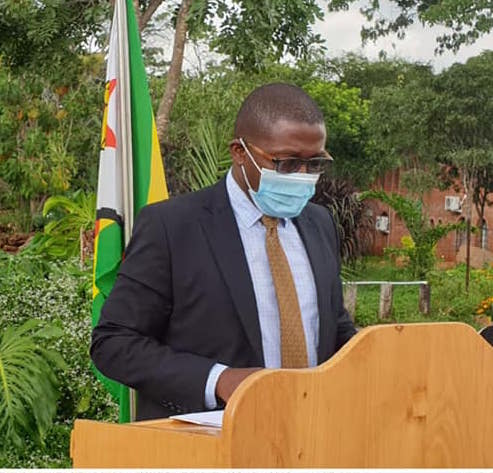COVID 19 has reduced the ability of the government, local authorities (Rural District Councils-RDCs) to fund the protection of wildlife and other natural resources from poaching, unsustainable exploitation and human-wildlife conflict, Hon Mangaliso Ndlovu, the Minister of Environment, Climate, Tourism, and Hospitality Industry has said.
He made the remarks during the hand over of equipment meant to revive the communal areas management programme for indigenous resources (CAMPFIRE).
The CAMPFIRE is premised on the conservation and sustainable utilization of wildlife and other natural resources as a livelihood option for rural communities. Fifty-eight (58) out of a total of 60 districts in the country are part of the programme, involving over 800,000 households. The programme helps to protect some 50,000 km2 of wildlife habitat in communal areas countrywide. This programme is anchored on the philosophy that people tend to conserve their natural resources when they have a sense of ownership and deriving benefits from such endeavour.
“It is no secret that the Covid-19 pandemic will have a lasting footprint on people’s lives, health, livelihoods, behaviours and overall global economic development. While the exact origin of the pandemic may never be resolved, its adverse impacts on global and national economies and on socio-economic development have never been in doubt. In the case of CAMPFIRE, it has denied communities incomes from both hunting and photographic safaris. This has directly and negatively impacted their livelihoods. This has been due to sharp declines and eventual drying up in tourist arrivals since March 2020 due to reduced tourist arrivals and cancelled hunts,” Hon Ndlovu said.
Since its inception, CAMPFIRE has been acknowledged as a world leader in Community Based Natural Resource Management (CBNRM). At the regional level, CAMPFIRE contributed significantly to CBNRM policy and is now generally accepted and practised widely across the Southern African Development Community (SADC). At the international level, CAMPFIRE has been influential in supporting the rights of local people to benefit from and manage their natural resources, and in developing an understanding of sustainable wildlife utilization and common property management. This is a testimony to the efficacy of the principles upon which the programme is based.
Hon Ndlovu revealed that apart from directly affecting communities, COVID 19 has reduced the ability of Government and Local Authorities (Rural District Councils-RDCs) to fund the protection of wildlife and other natural resources from poaching, unsustainable exploitation and human-wildlife conflict.
The pandemic has also exposed the need to urgently diversify the livelihoods of communities that reside in CAMPFIRE areas. For its part, the Government has been working with various stakeholders, including local and international NGOs, the private sector and international development partners to ensure that the adverse impacts of Covid-19 on the livelihood of CAMPFIRE communities and the country’s rich biological heritage are minimized.
Forests provide essential livelihoods and environmental services and they have re-taken centre stage in global conversations about sustainability, climate and biodiversity. Forest mega disturbances; changing rural demographics; the rise of the middle-class in low- and middle-income countries; increased availability, access and use of digital technologies; and large-scale infrastructure development are the five large-scale trends that are likely to have substantial medium- and long-term effects on forests and forest livelihoods.
These trends represent human and environmental processes that are exceptionally large in geographical extent and magnitude, and difficult to reverse. Understanding these larger-scale dynamics is key to support not only the critical role of forests in meeting livelihood aspirations locally but also a range of other sustainability challenges more globally.
